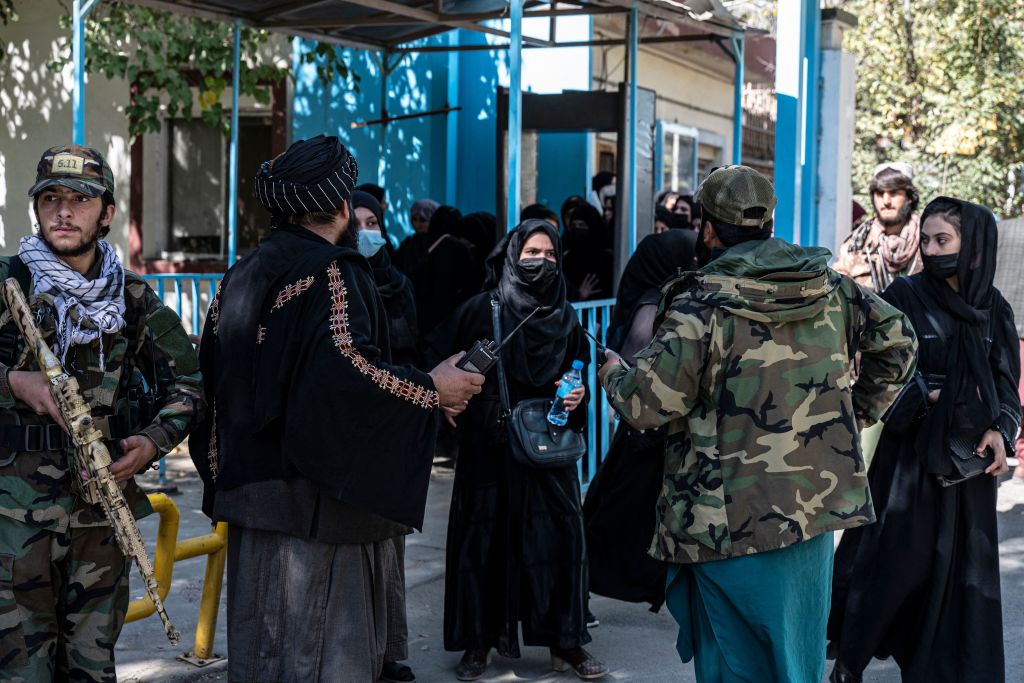As soon as the Taliban took over Afghanistan in August 2021 they placed restrictions on women’s right to work. Then they closed girls’ secondary schools, depriving teenage girls of their right to an education. In December, they banned women from attending universities and working for non-governmental organizations.
The consequences for Afghan women have been devastating. Yet they continue to resist, despite the immense dangers.
Ahead of International Women’s Day, Zan Times spoke to three Afghan women for The Fuller Project about their struggle. Here are their stories, told in their words, translated and edited for clarity. All three appear under pseudonyms.
Sara, 26, lost her job when the Taliban banned women from working for NGOs. She lives alone in Kabul and was the sole breadwinner for her parents and siblings.
August 15, 2021 was a black day for me. I was at work in Kabul when the managers dismissed everyone, saying the situation was bad and we should go home as soon as possible.
I returned to my small rented room. The walls echoed with the sounds of fear. I closed the windows and drew the curtains. I wanted someone by my side to comfort me and tell me that everything would be ok, but my body was trembling from fear.
I went back to the office a week after the Taliban took over Afghanistan. My clothing became a subject of discussion, although I wore the hijab and only my eyes were visible. I stayed because I really needed the job and the salary.
On December 24, 2022, the Taliban banned women from working at non-governmental organizations and my managers announced I was laid off until further notice. I’m still in Kabul, but my money is running out. I am looking for a job because I have to pay the rent for my room in Kabul, but no one hires women anymore.
Every night, I pray that I will find work again so I can pay my expenses and rent. Yesterday, I bought bread. As I pay the bakery monthly, I get only enough to eat bread once a day. For the last three days, I’ve eaten just bread and tea. All I have left are two onions and a little oil. I don’t know how long I can endure like this.
Raha, a 22-year-old student from Badakhshan in northeast Afghanistan who staged a protest after being barred from entering her university.
The Taliban gunmen at the entrance refused to allow us into the university because we were wearing colorful winter coats over our black hijabs. Only those who were completely dressed in black were allowed in. We got angry and we pounded on the gates, demanding that they be opened. Then a Taliban soldier opened a gate and began beating the girls who were standing there. He whipped their legs, backs, shoulders, and even their heads. It [beatings] only ended when the university president came to the entrance and told the gathered students to accept whatever the Taliban said.
When we got inside, Taliban agents insulted us and the women students of the literature and journalism department decided to protest. By the time we poured out onto the street to march on the Taliban governor’s office, there were more than 70 of us.
The Taliban followed us in pick-up trucks, whipping protesters. When we arrived at the last intersection before the governor’s office, the Taliban gunmen in the trucks pointed their weapons at us, saying, “You can’t continue anymore. Stop! If you continue, we will kill you.”
[Afterwards] we were afraid that they would come after us so we decided to separate and go to relatives’ homes. The next day, the Taliban announced they would close the university if students protested again. So we stopped. Finally, on December 20, 2022, they closed universities across Afghanistan.
Mahtab, 23, a student in Kandahar in southern Afghanistan, was finishing her bachelor’s degree when she learned that the Taliban had barred women from higher education.
I felt sick, telling myself that the news must be a lie, and perhaps someone had published a fake announcement. But in a WhatsApp group on my phone, I saw that students were sharing the announcement.
Tears welled in my eyes as I read the messages. I’m from Daikundi province and had been so happy when I was accepted to Kandahar University. My family and relatives were against the idea of me traveling to a distant province, but I had a strong will to study and I made it clear that I could not miss this opportunity – I wanted to become a lawyer.
Life was a struggle for my family. My father could hardly feed our family of seven. Every time I went home and saw my father going to work with his wooden wheelbarrow, hawking from morning to night, I vowed to study harder so I could find a good job after university and get my family out of this situation.
Now, despite all my hard work, I didn’t get a diploma. While the boys had a magnificent graduation ceremony in the presence of 16 Taliban ministers, I collected my belongings and returned to Daikundi.
I studied to build the future, but in the end I had nothing. I don’t even have hope now. Every day we witness the burning of our dreams and rights. This is no place for women and girls to live.


 Zahra Nader
Zahra Nader
